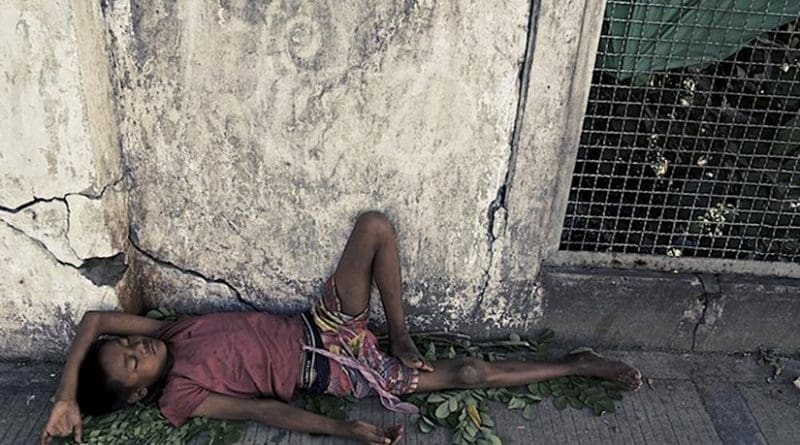Burma Blacklists Two US-Based Reporters For Covering Rohingya Crisis
By Hanna Hindstrom
Two US-based journalists have been blacklisted by the Burmese government after they visited conflict-struck western Arakan state to cover the ongoing persecution of the Rohingya Muslim minority, DVB has learned.
The reporters, who work for an independent photography agency, say they were verbally told by officials at the Burmese embassy in Washington DC earlier this month that they were banned from returning to Burma.
Officials reportedly told Matt Rains and Alia Mehboob from Lux Capio Photography Agency that they could not be issued visas because they had entered “restricted” Muslim areas on a previous visit to Arakan state and should “try again in a year”.
In April, on their most recent trip to the restive state, the reporters were besieged by a Buddhist mob while visiting a mosque on the outskirts of Sittwe’s Muslim quarter, Aung Mingalar, before being detained by immigration authorities and sent back to Rangoon where they say they were followed by military intelligence.
The pair, who held tourist visas, said they had received formal permission from the Ministry of Tourism in Rangoon to visit any area in the Arakan capital, but were refused entry by police guarding Aung Mingalar. They subsequently visited a nearby mosque that seemed to have been taken over by local Buddhists, when a mob approached them.
“People started coming in from all over. One guy flashed his [penis] at Alia; they were trying to take potshots at us from behind. They tried to grab my camera equipment,” explained Rains.
In video footage taken by the reporters, police can be seen brandishing rifles at the pair, while locals attempt to grab their cameras. A man in civilian clothing, claiming to be “the chairman”, bursts into the mosque, shouts at them to “get out” and demands that they hand over their passports.
The pair immediately offered to go to the police station, where their passports were confiscated for several hours and the authorities booked them on the first flight back to Rangoon. After repeated requests for an explanation as to why they were being deported, the police said they had entered a “restricted” zone.
“We were let go in Rangoon, but we had four to six men following us wherever we went, two cars that would just park outside Trader’s Hotel and they would just sit in the lobby waiting for us,” said Rains. “It got to the point where it was too dangerous for anyone to meet with us, so we just booked flights out.”
A spokesperson for the Arakan state government told DVB that although he was unfamiliar with the case, journalists are obligated to travel on media visas and obtain permits before entering some areas that were ravaged by Muslim-Buddhist clashes last year. The President’s Office was not available for comment.
Aung Win, a local Rohingya media fixer, confirmed that the authorities have clamped down on journalists who want to visit Aung Mingalar, where thousands of Muslims are trapped without access to international aid or livelihoods.
“You must get a permit from the Rakhine [Arakan] state government,” said Aung Win. “I can take [journalists] around to IDP camps, but they are not allowed to visit Aung Mingalar.” He added that more recently journalists have also been able to obtain the necessary permits.
But critics say this is an attempt by the former military regime, which has been implicated in mass atrocities against the stateless Rohingya community, to monitor journalists reporting on their persecution. It follows two bouts of deadly ethno-religious clashes in western Burma, which uprooted over 140,000 people, mostly Muslims.
Rains and Mehboob say it is not the first time they have faced harassment attempting to document abuses against the Rohingya, who are considered illegal Bengali immigrants and denied basic rights by the Burmese government. In August 2012, the journalists were repeatedly “locked and loaded” by Arakan police, while locals threatened to “burn” Alia, who is Muslim and a Pakistani national.
US national Rains recalls another incident in Mrauk-U, northeast of Sittwe, which he described as “straight-up Third Reich text book”. The pair had sat in a local movie theatre to watch a film, when an “old-school patriotic national anthem” began playing and Arakanese words started flashing on the screen.
When they asked a man sitting next to them what it was saying, he replied: “’It’s talking about how the Rohingya are burning houses and murdering and killing people’,” said Rains. The moment Rains took out his camera, the screen switched to a “cheesy 80s soap opera show” and the manager asked them to leave. “It’s propaganda at its best and worst at the same time,” he added.
The Burmese government has received international praise for introducing a series of democratic reforms, including easing media restrictions and stripping names from the notorious junta-era blacklist, which barred many western journalists from entering the country. But analysts say that as many as 4,000 names could still be on the list, while military intelligence continues to monitor reporters covering a recent tide of anti-Muslim violence.

